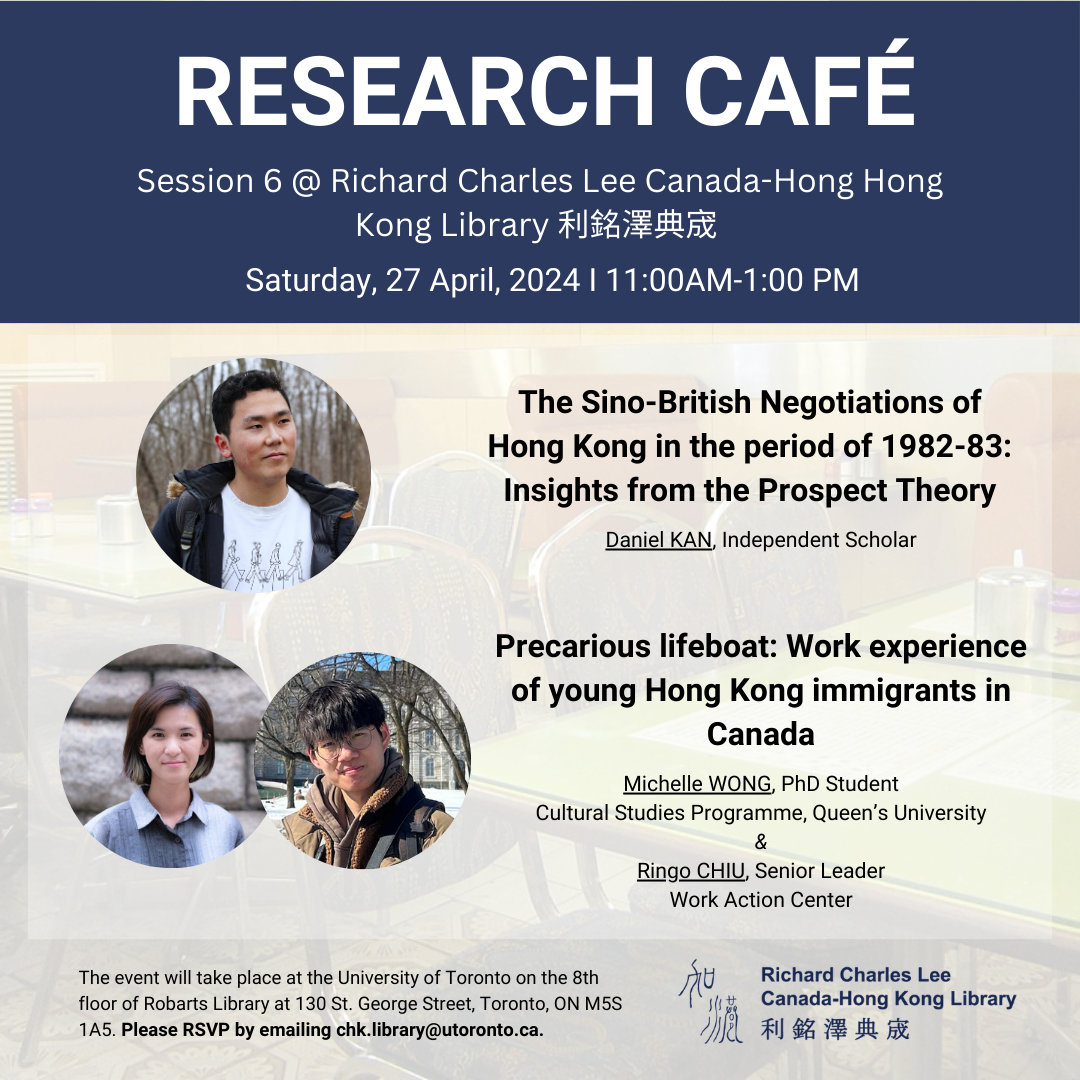
The RCL CHKL Research Café will host its 6th session on Saturday, April 27, 2024, from 11 am to 1 pm. During this session, Daniel KAN (Independent Scholar). Michelle WONG (PhD Student, Cultural Studies Programme, Queen’s University) and Ringo CHIU (Community Organizer based in Toronto) will present their research. Daniel will discuss his work titled “The Sino-British Negotiations of Hong Kong in the period of 1982-83: Insights from the Prospect Theory,” while Michelle and Ringo will present their research titled “Precarious lifeboat: Work experience of young Hong Kong immigrants in Canada.” There will be an opportunity for questions and discussion following their presentations.
The Research Café is an initiative based at the Richard Charles Lee Canada-Hong Kong Library, aiming to unite scholars interested in Hong Kong-related research to encourage scholarly exchange and promote multidisciplinary dialogue. Light refreshments will be provided. If you wish to join us, kindly RSVP by sending an email to chk.library@utoronto.ca before Thursday, April 11, 2024.
The Sino-British Negotiations of Hong Kong in the period of 1982-83: Insights from the Prospect Theory
Daniel Kan (Independent Scholar)
Through this paper, I wish to provide more insights into how the British colonial government resulted in the decision to hand over Hong Kong in 1997 under the "gang ren zhi gang"(Hong Kong people rule Hong Kong) system.
The paper uses Prospect Theory to analyze the decision-making processes of British officials during the negotiations. I argue that the shift in British preferences was led by Percy Cradock's new interpretations of the status quo in September 1983, based on two different factors. The paper suggests that the framing effect of Prospect Theory, which implies that individuals tend toward risk acceptance when confronted with choices between losses and risk aversion when confronted with choices over gains, played a significant role in the negotiations. In the paper, I conclude that the British decision to give up sovereignty and administration in Hong Kong was influenced by their framing of the situation as a potential loss, leading to a risk-acceptance approach.
Precarious lifeboat: Work experience of young Hong Kong immigrants in Canada
Michelle Wong (PhD Student, Cultural Studies Programme, Queen’s University) and Ringo Chiu (Senior Leader, Work Action Center)
In 2021, Canada established the Hong Kong 'lifeboat' pathway, a bespoken immigration route for young Hongkongers seeking refuge. This decision was motivated by a commitment to supporting the democratic values advocated by Hongkongers in response to Chinese authoritarian regime. However, we argue that this immigration pathway, while attracting highly educated and fit-to-work young individuals, exposes these immigrants to the risks of precarious employment. Recent immigrants from Hong Kong encounter challenges such as skill devaluation, labor rights infringements, and discrimination. As a result, the Hong Kong Pathway, as a skilled migration program, may not fully realize the desired economic growth or the humanitarian solidarity that the Canadian government aims to achieve.
Drawing on data collected from an online anonymous forum and firsthand experience in community organizing, this project seeks to examine the obstacles to economic integration faced by Hong Kong immigrants and contribute to the discussion of Canadian skilled-immigration policy.